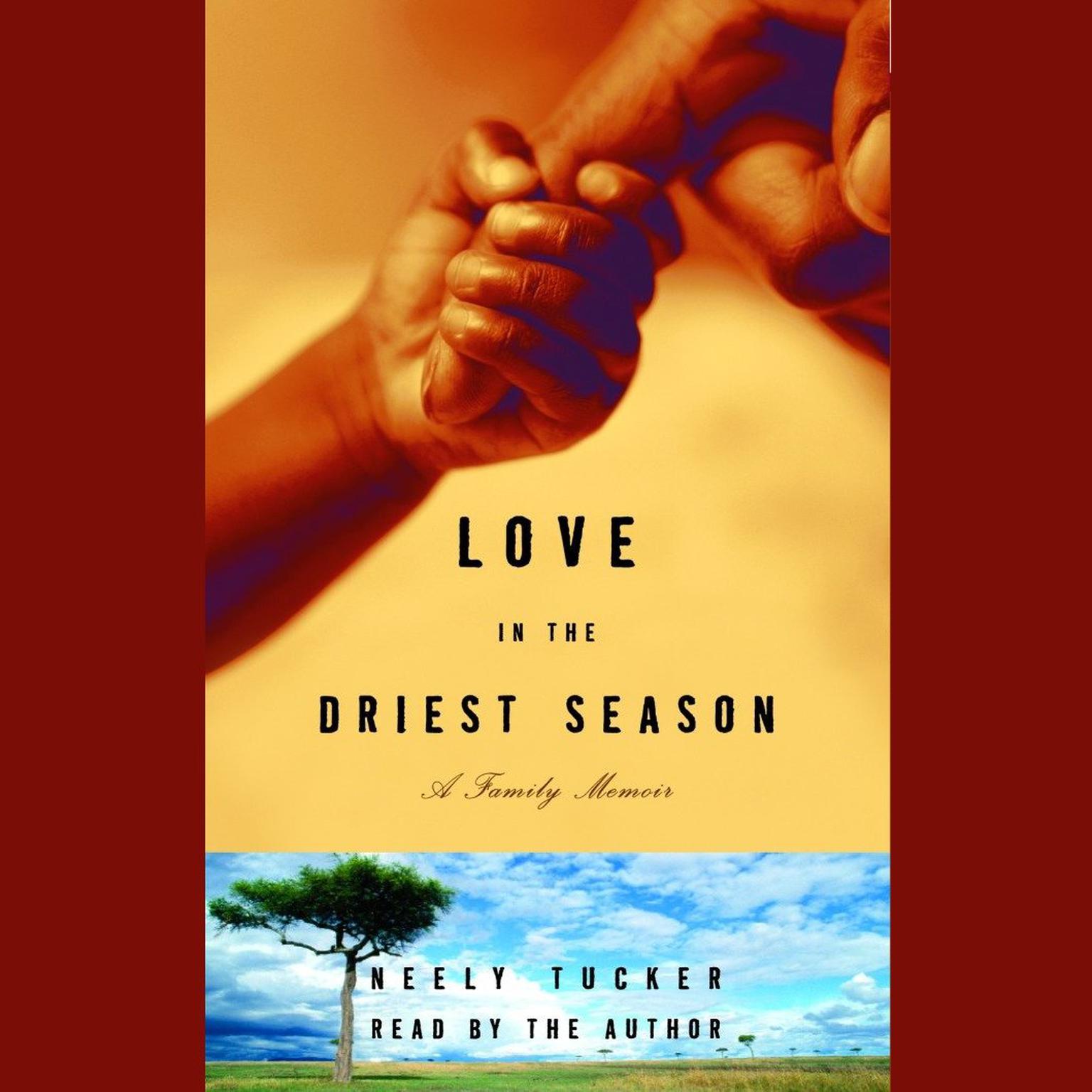 Play Audiobook Sample
Play Audiobook Sample
Love in the Driest Season (Abridged): A Family Memoir Audiobook
 Play Audiobook Sample
Play Audiobook Sample
Quick Stats About this Audiobook
Total Audiobook Chapters:
Longest Chapter Length:
Shortest Chapter Length:
Average Chapter Length:
Audiobooks by this Author:
Publisher Description
Foreign correspondent Neely Tucker and his wife, Vita, arrived in Zimbabwe in 1997. After witnessing firsthand the devastating consequences of AIDS on the population, especially the children, the couple started volunteering at an orphanage that was desperately underfunded and short-staffed. One afternoon, a critically ill infant was brought to the orphanage from a village outside the city. She’d been left to die in a field on the day she was born, abandoned in the tall brown grass that covers the highlands of Zimbabwe in the dry season. After a near-death hospital stay, and under strict doctor’s orders, the ailing child was entrusted to the care of Tucker and Vita. Within weeks Chipo, the girl-child whose name means gift, would come to mean everything to them. Still an active correspondent, Tucker crisscrossed the continent, filing stories about the uprisings in the Congo, the civil war in Sierra Leone, and the postgenocidal conflict in Rwanda. He witnessed heartbreaking scenes of devastation and violence, steeling him further to take a personal role in helping anywhere he could. At home in Harare, Vita was nursing Chipo back to health. Soon she and Tucker decided to alter their lives forever—they would adopt Chipo. That decision challenged an unspoken social norm—that foreigners should never adopt Zimbabwean children. Raised in rural Mississippi in the sixties and seventies, Tucker was familiar with the mores associated with and dictated by race. His wife, a savvy black woman whose father escaped the Jim Crow South for a new life in the industrial North, would not be deterred in her resolve to welcome Chipo into their loving family. As if their situation wasn’t tenuous enough, Zimbabwe President Robert Mugabe was stirring up national fervor against foreigners, especially journalists, abroad and at home. At its peak, his antagonizing branded all foreign journalists personae non grata. For Tucker, the only full-time American correspondent in Zimbabwe, the declaration was a direct threat to his life and his wife’s safety, and an ultimatum to their decision to adopt the child who had already become their only daughter. Against a background of war, terrorism, disease, and unbearable uncertainty about the future, Chipo’s story emerges as an inspiring testament to the miracles that love—and dogged determination—can sometimes achieve. Gripping, heartbreaking, and triumphant, this family memoir will resonate throughout the ages.
Download and start listening now!
"A book to keep you on the edge of your seat, Mr. Tucker's account of living and adopting in Zimbabwe is troubling and hard to put down. He writes about the horrifying collapse of family structure due to the AIDS epidemic in Africa with great perception and clarity. The plight of orphans in Zimbabwe is terrible to learn and this book offers no hope for improvement, which is the unfortunate reality of the situation. The specifics of his personal journey are fascinating but made me very anxious to read. Until the very end of the book, it is not clear how his family's situation could be resolved. A very good book, well-written and edifying."
— Yvonne (4 out of 5 stars)
Awards
-
Selected for the Barnes & Noble Discover Award
Love in the Driest Season Listener Reviews
-
" Neely Tucker and his wife Vita move to Zimbabwe where he is stationed as a foreign correspondent. At the time, AIDS, the economic and political unraveling of the country left thousands of orphans in its wake. While volunteering at an orphanage in Harare, an abandoned infant on the brink of death arrives and Vita is charged with taking the baby to the hospital for care. The hospital discharges the baby on the condition that she go home with Vita rather than back to the orphanage where she would surely die. And so, Vita and Neely become the caregivers and ultimately, the family of little Chipo. The trouble is, in the midst of the anti-American climate brewing in Zimbabwe at the time, combined with a mind-numbing bureaucracy and rampant corruption, it takes more than one miracle for the Tuckers to not only legally adopt Chipo, but to get her (and themselves) out of the country before it was too late. "
— Erika, 2/13/2014 -
" "Love in the Driest Season" was a fascinating book set in Zimbabwe. The story was compelling and the writing was well-done. It was a book that made me think a lot about the country, differences in culture, and the exploding problem of AIDS in Africa. I highly recommend the book. "
— Debbie, 2/13/2014 -
" Exceptional memoir of the years in Zimbabwe while Tucker covers every African horror story and tries to adopt a little Zimbabwe child who was abandoned. Beautifully written. "
— Leslie, 1/16/2014 -
" Interesting - learn about Zimbawe craziness "
— Robbie, 1/13/2014 -
" Amazing tale of AIDS orphans, places hit hardest and how difficult it is for foreigners to make a positive difference in these countries. "
— Kari, 12/28/2013 -
" gripping. Would I be so dedicated in adopting a child from Zimbabwe? "
— Arlene, 12/20/2013 -
" I didn't have any idea what Zimbabwe was like or the process of adoption. That was interesting. Neely Tucker is a great writer. He kept my attention. Couldn't put the book down. "
— Tana, 12/9/2013 -
" A touching story of a journalist and his wife trying to adopt a baby from Zimbabwe. The book gives lots of information about the political instability in Africa. There ia also a discussion about the severity of the AIDS situation there. "
— Kathy, 11/8/2013 -
" A wonderful book about adoption and other cultures - valuable insight into Zimbabwe. This book is not uplifting, but is educational and exhausting and rewarding. "
— Meghan, 11/8/2013 -
" Didn't finish it. An interesting story, but lost my interest with all of the side stories about Neely's assignments. I would have liked to hear more about the wife/baby. "
— Kara, 10/23/2013 -
" I read this book after my first trip to Zimbabwe. "
— Bonnie, 7/29/2013 -
" This book was not for me. So many babies dying of AIDs was just too sad. There weren't enough uplifting parts to balance it out and make it more readable. It as eye opening though. That's why I'm giving it 2 stars instead of 1. "
— Jane, 6/27/2013 -
" Quite possibly one of the best authors I've ever read. An amazing memoir that will draw you in and you won't be able to put down. "
— Briannaheldt, 6/10/2013 -
" I am listening to this book and it is SO way good!!! "
— Cynthia, 5/28/2013 -
" I read this a few years ago and it was a heartwarming story. "
— Wendy, 5/22/2013 -
" This is a beautiful adoption story. I didn't want to put the book down with all the twists and turns the couple experiences. The cultural factors that complicated the process particularly fascinated me. This is a great read for anyone. "
— Rachel, 8/9/2012 -
" moving,tremendously sad memoir of Tucker's life as a journalist in zimbawe,his marriage to an african american woman,and their struggles in adopting and rescuing a baby,Chipo, there.depicts the pain of african nations and the fear and ignorance that allows aids to flourish.well done. "
— Laura, 7/26/2012 -
" A memoir of a US journalist in Zimbabwe in the 90's. The book gives a very sad, close-up view of AIDS orphans and focuses on the author's determination to adopt one of them. Interesting writing. "
— Jenny, 5/6/2012 -
" A tug-at-your-heartstrings story with a happy ending. Especially poignant for adoptive parents and their children. "
— Erica, 2/25/2012 -
" A family memoir with fiction-like twists--an interracial marriage between a white man and a black woman who show amazing perseverance to adopt a baby girl from Zimbabwe. Touching, with insight into the life of a journalist, the Aids epidemic and the political sturggles in Africa. "
— Nanette, 9/27/2011 -
" I read this as our family began the process of adoption... "
— Meggityb, 8/20/2011 -
" I guess I'm really into these memoirs written by people that do amazing things...I loved this book and couldn't wait to pick it back up. Now I need to find another inspiring story! "
— Melinda, 8/5/2011 -
" Too much caffeine and a bad storm? This book is one to read all. night. long. "
— Leslie, 4/28/2011 -
" This book made me thankful for our relatively easy adoption process. It also broke my heart to hear the plight of Zimbabwe's orphans. "
— Brooke, 4/21/2011 -
" The true life story of what happens when you open yourself up to life, love, and a world bigger than your own problems. "
— Katie, 2/25/2011 -
" Not a bad book but very predictable. "
— Laur2367, 2/6/2011 -
" A memoir of a US journalist in Zimbabwe in the 90's. The book gives a very sad, close-up view of AIDS orphans and focuses on the author's determination to adopt one of them. Interesting writing. "
— Jenny, 1/13/2011 -
" moving,tremendously sad memoir of Tucker's life as a journalist in zimbawe,his marriage to an african american woman,and their struggles in adopting and rescuing a baby,Chipo, there.depicts the pain of african nations and the fear and ignorance that allows aids to flourish.well done. "
— Laura, 1/3/2011 -
" This book is obviously written by a journalist. His worldview and love for his daughter are really worth respecting. "
— Michelle, 12/28/2010 -
" wonderful book...the true story of a reporter and his wife, assigned to Zimbabwe, who moved heaven and hell in their efforts to adopt a child from that country while they were stationed there. great writing and a great insight into at least a slice of life in Zimbabwe. "
— Ann, 12/14/2010 -
" I loved this book, for reasons too obvious to list. "
— Sara, 11/21/2010 -
" This book was not for me. So many babies dying of AIDs was just too sad. There weren't enough uplifting parts to balance it out and make it more readable. It as eye opening though. That's why I'm giving it 2 stars instead of 1. "
— Jane, 11/18/2010 -
" I LOVED this book. It was frustrating to read what the family went through to adopt. The adoption policies in some countries is just baffling. It's a happy ending though, and you know it will be throughout the story. "
— Andrea, 10/24/2010 -
" Oh my word, I loved this book. It's so well written and, I'll admit it, it made me bawl... in a good way. "
— Heather, 9/27/2010 -
" Part adoption tale, part foreign correspondent in corrupt war torn country tale. Engaging, heart-breaking and joyous. "
— Amy, 9/22/2010
About Neely Tucker
Neely Tucker was born in Lexington, Mississippi, one of the poorest places in America, in 1963. He worked for newspapers in Miami and Detroit before taking postings in Europe and sub-Saharan Africa. Filing stories from more than sixty countries, he frequently covered war and violent conflict. When he returned to Washington, DC, in 2000 to work for The Washington Post, he covered criminal courts and the fates of former prison inmates. Elmore Leonard, a friend in Detroit, used him as the basis and namesake for a foreign correspondent in “Cuba Libre.” Tucker is now a staff writer for the Post’s Sunday Magazine and lives just outside DC with his wife, Carol, their three children, and one very large Rottweiler who is, of course, named Sully.







